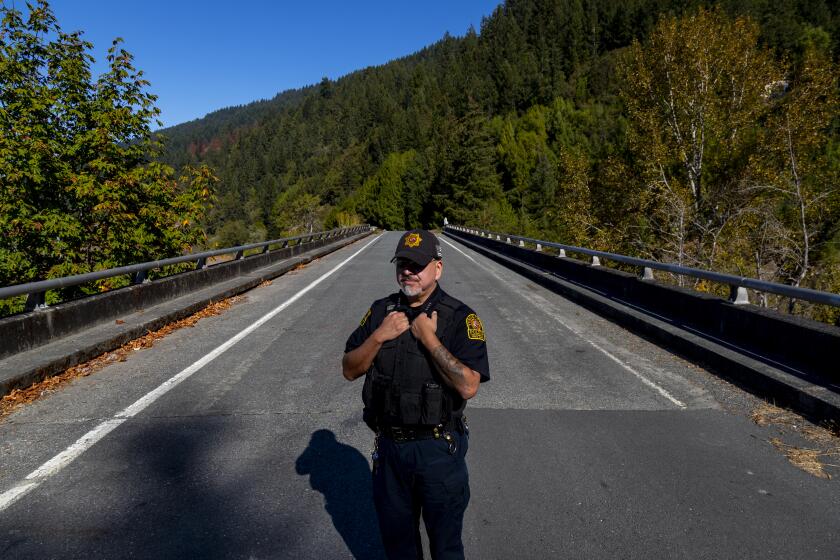After recent killings on California reservation, tribes ask for help to stem violence
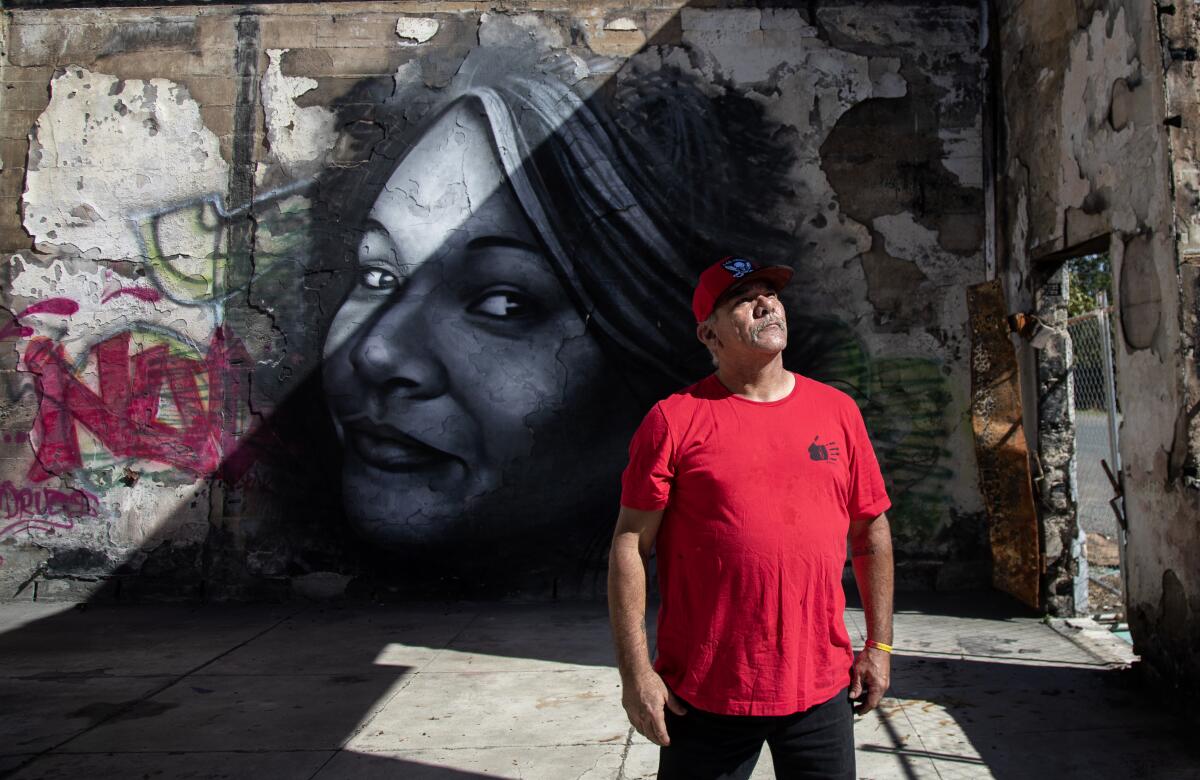
- Share via
Even for a community already accustomed to some level of violence, the two brutal killings on a rural Northern California reservation this spring were a shock.
Nicholas Shehli Whipple had been so severely beaten that Round Valley Indian Tribal police didn’t initially notice the 20-year-old had been shot. Three weeks later, 16-year-old Ruby Sky Montelongo’s body was discovered in a vacant field in Mendocino County by her uncle, Gerald “Lij” Britton.
A Northern California tribal police chief is challenged personally and professionally with how to solve a crisis of missing and murdered Indigenous women and girls.
Lij Britton has been through this before. His daughter, Khadijah Britton, vanished from the remote reservation in February 2018 after “being forced into a car at gunpoint by her ex-boyfriend,” according to the FBI. The Mendocino County Sheriff’s Office has a suspect in the case, but without a body, officials say it’s difficult to make an arrest. She was 23 when she disappeared.
The recent violence, along with Khadijah Britton’s unsolved disappearance, underscore the challenges California tribes face in stemming the crisis of missing and slain Indigenous people. The centuries-long problem stretches back to white settler colonialism and the forced removal of Indian children into boarding schools, worsened by a broken foster-care system and the ravages of drugs, domestic violence and human trafficking.
“[Lij’s] daughter is missing, mine is murdered. Missing and murdered,” said Montelongo’s mom, Nikki Britton.
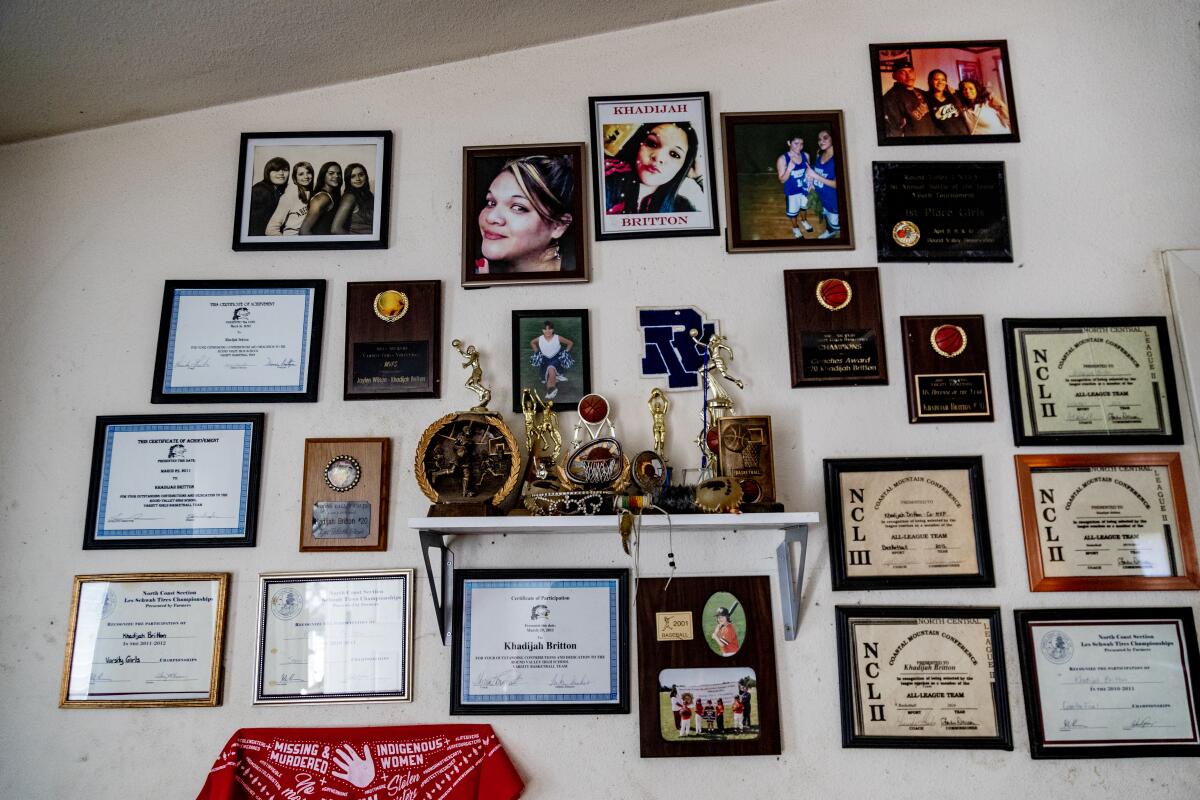
The two slayings prompted Round Valley Indian Tribes to declare a state of emergency on April 16, just one day after Montelongo was found dead and less than a month after Whipple was killed.
The declaration followed a similar one issued by the Yurok in Del Norte and Humboldt counties in December 2021 after the disappearance of Emmilee Risling, a 32-year-old mother of two who was last seen along the Klamath River in a densely forested area not far from the Oregon border.
Incomplete data make it difficult to pinpoint the number of Native people who’ve gone missing or been killed, but federal officials estimate some 4,200 cases have gone unsolved across the country.
Women and girls are disproportionately affected because they’re frequently targeted for human trafficking or are victims of domestic violence. The nonprofit Sovereign Bodies Institute recorded 183 cases of missing or slain Indigenous women and girls in California, according to a 2021 report, though experts say that’s probably a significant undercount.
Round Valley Indian Tribes President Randall Britton said the killings highlight the urgent need for greater investment in youth services and programs to better safeguard young members. The emergency declaration aims to raise awareness on the violence plaguing California’s tribes, especially those in the northern half of the state, and bring attention to the lack of resources they have to solve it.
“We’re not only seeking resources for more law enforcement. We also need resources for the healing of our community,” said Randall Britton, who is a relative of Montelongo and Khadijah Britton.
The calls for help have reached the state Capitol, where lawmakers participated in a series of events last week to learn about the crisis and what solutions they can pass into law. The effort was led by Assemblymember James Ramos, a Highland Democrat and former chairman of the San Manuel Band of Mission Indians who made history in 2018 as the first California Native American elected to the Legislature.
Ramos coordinated a news conference and public hearing on the crisis, along with a candlelight vigil at the Capitol that drew hundreds of tribal members from across the state.
“The cases of missing and murdered Indigenous persons continue to happen. This isn’t something of the past. This continues to happen today,” Ramos said on the Assembly floor as he presented a resolution declaring May a month to raise awareness of the issue. “California is moving in the wrong direction, and we need allies in our fight to bring awareness and resources to California’s first people.”
::
Ruby Sky Montelongo was a fighter from the start.
Born at the Central California Women’s Facility in Chowchilla while Nikki Britton was doing a stint in prison, Montelongo helped turn her mom’s life around.
“She changed my life,” Nikki Britton said in a phone interview with The Times. “Ruby was kind of like a little miracle baby.”
Even as a teenager, Montelongo was a tiny thing, her mom said, hardly 5 feet and 120 pounds. But she never backed down from a fight. She was a fast runner and played basketball at Round Valley High School. She wanted to be an actor or some kind of performer.
Montelongo was an enrolled member of Round Valley Indian Tribes, but also had Cherokee heritage, her mom said. She was very proud of her background and because of her relative Khadijah’s disappearance, was invested in the movement to bring attention to violence against Native women.
“She was a straight little warrior woman, a warrior woman princess,” Nikki Britton said.
Montelongo was out with friends the night of April 14 when a fight broke out. A group of girls allegedly jumped and assaulted her, Nikki Britton said. Only one has been arrested, a 15-year-old who was booked on a murder charge, according to the Mendocino County Sheriff’s Office.
“It’s just painful, knowing that she’s not going to ever come walking through that door again. She’s not going to graduate with the class. She’s not going to be standing up there,” Nikki Britton said, adding that she’s pushing for more arrests.
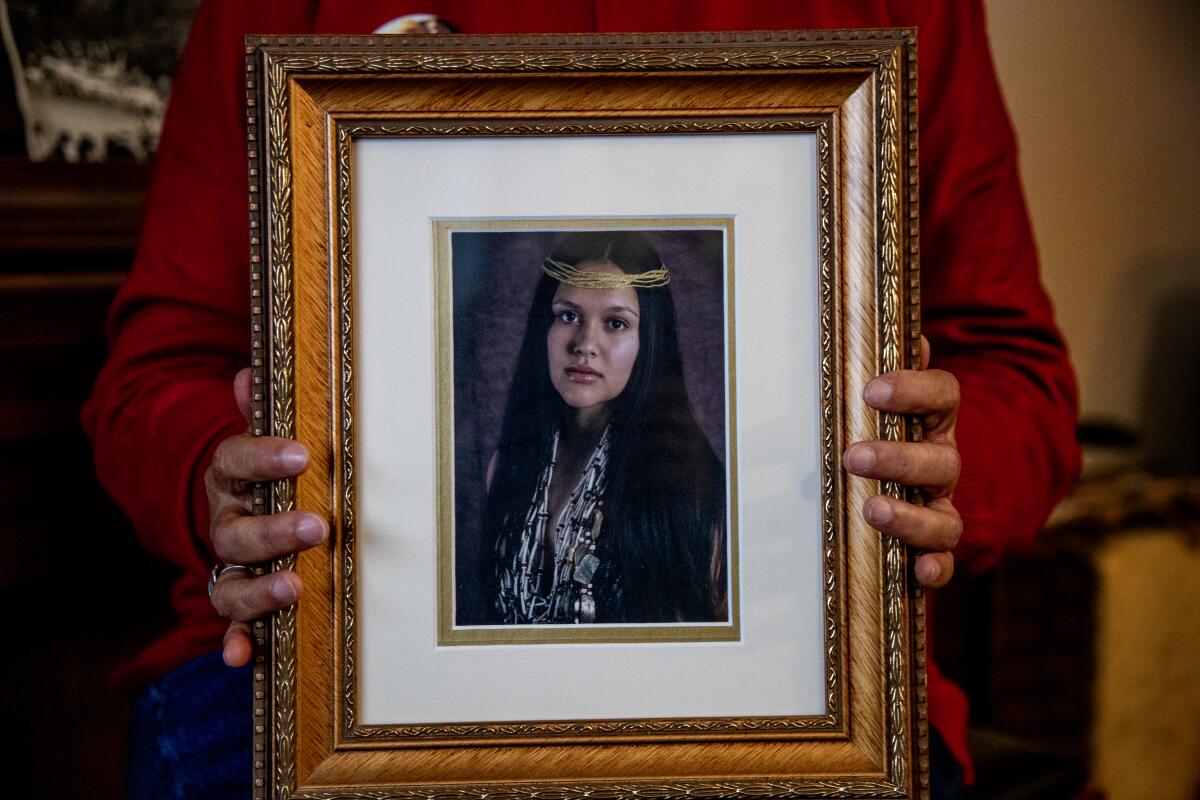
“What’s going on with our people?”
::
Despite entering the union as a free state, California’s first Legislature passed a law in 1850 to legalize indentured servitude of Native children. Tribal leaders say that historical trauma has helped fuel today’s crisis.
Nearly 175 years later, they’re calling on the state to approve legislation that will give them what they need to help end the violence.
They’re pushing lawmakers to pass bills that Ramos wrote to improve public safety on tribal lands and dedicate $200 million in the state budget for tribes to use to prevent more cases. One of Ramos’ bills would strengthen procedures for social workers and county officials to take when kids go missing in foster care, while another would grant tribal police and courts access to the California Law Enforcement Telecommunications System, which tracks domestic violence restraining orders.
Those efforts would add to laws Ramos has passed in recent years to create an alert system for when Native people go missing and another that directed the state Department of Justice to help California tribes combat the problem.
During their week in Sacramento, tribal officials also asked for more sweeping changes to the state’s foster-care system and for an overhaul to a federal policy known as Public Law 280, which stripped tribes of prosecutorial authority over most crimes that occur on their reservations.
Ramos and the tribal leaders who spoke at the Wednesday vigil said that speaks to the momentum of the movement and the attention finally being paid to those who’ve been abducted or killed.
“Why do we have to come together and hold a vigil like this to bring awareness to public safety? Is it because our youth don’t have bright futures like others?” Ramos said during the event. “We would argue no. Our youth are the brightest future here in the state of California and are worth making sure we are protecting and carrying their voices forward.”
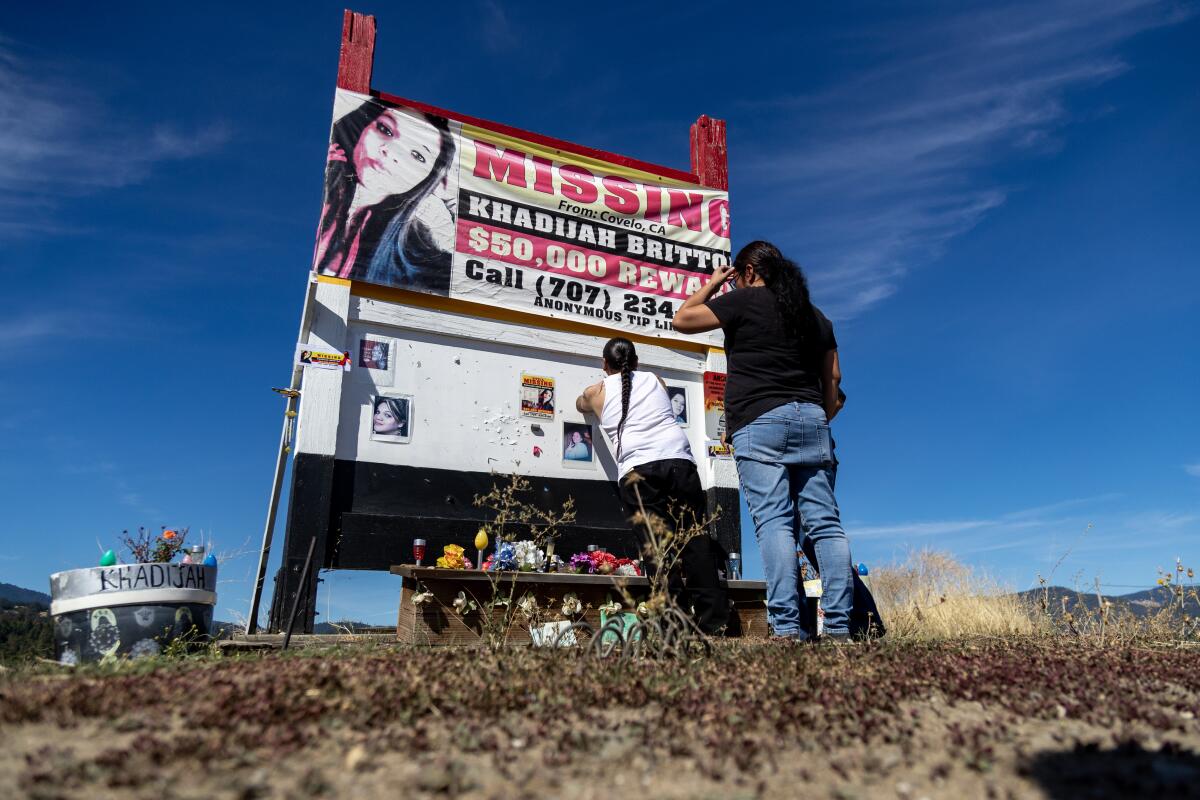
As he spoke, the Capitol dome for the first time was illuminated red for the occasion, the color of the movement to raise awareness on the issue. Several people in the crowd had painted a red hand over their mouths, and hundreds held red candles that symbolize the awareness campaign.
Behind each speaker, the names and pictures of dozens of victims flashed across a large screen set up to livestream the event. Among those memorialized was Khadijah Britton.
In an interview at his home in October, Lij Britton said Khadijah Britton was an MVP basketball player, an energetic and outspoken young woman. Her family remembers her as a protector, someone always ready to stand up for the bullied.
“She was my baby, my baby girl,” said Lij Britton.
In the crowd at the Capitol on Wednesday was Anthony Flores, Whipple’s uncle, holding a large poster with his relative’s name and picture on it.
Flores said Whipple was a good kid, a “kind person” who grew up in rural California and a member of the Kletsel Dehe Wintun Nation.
A suspect was arrested at the end of April in connection with Whipple’s killing, but Flores said he wants to see justice for all tribal members who are missing or have been slain.
“We are ignored, and we don’t want to be ignored,” Flores said. “They have names. They were loved. They loved people too. And we miss them.”
More to Read
Sign up for Essential California
The most important California stories and recommendations in your inbox every morning.
You may occasionally receive promotional content from the Los Angeles Times.
